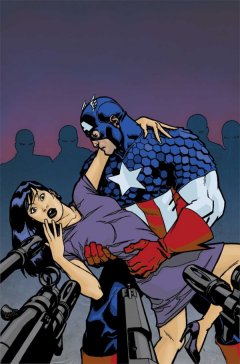Captain America #25
Writer: Robert Morales
Artist: Chris Bachalo
In September
2001, Captain America was in the middle of a 4 part
arc called "America Lost." It pitted Cap and the
Avengers against Red Skull and Hate-Monger in a story that
was supposed to be about fighting bigotry, but turned out
to be another big team-up involving the Cosmic Cube. It was
a pretty standard Captain America storyline.
Then,
in the real world, al-Qaeda rammed two jets into the heart
of Manhattan.
In an
uncharacteristic display of wisdom, Marvel wrapped Captain
America volume 3 at issue #50 three months later and took
Cap back to basics, shedding most of the elements of the Marvel
Universe that made his patriotic message ring so hollow and
restarting the series as a Marvel Knights title. The first
issue of Captain America volume 4 was possibly the
greatest 9/11 comic ever made.
But, like
all things (especially those from Marvel), it wasn't to last.
Cap eventually learned the terrorists he was fighting were
merely pawns of a supervillain, uber-artist John Cassaday
left at issue #6, and, two months later, writing duties were
handed over to Chuck Austen (you may boo… now). The series
rapidly descended into battles with Atlanteans and Thunder
Gods, and a big "ho-hum" was had by all.
The current
arc, however, has gone where no recent Captain America
storyline even considered, having Cap hunting for al-Qaeda
terrorists escaped from Guantanamo Bay, struggling with the
Cuban soldiers assigned to work with him, and revisiting the
darker side of the modern American military.
Having
taken down the terrorists in the last issue, Cap suddenly
found himself at the unfriendly end of one of his Cuban partners'
rifle while she proclaimed al-Qaeda's local bioweapon stockpile
property of the Cuban people. Cap, of course, saw things differently
and set off a S.H.I.E.L.D. transmitter that would microwave
the immediate area in eight minutes, irradiating the viruses
in the canisters, yet at the same time giving Castro the impression
that he'd nabbed a major weapons cache from right under the
U.S.'s nose.
A few
microwaved buildings and a hearty handshake with ol' Fidel
later, Cap finally speaks with Prof. Hedayat (an Iranian-American
falsely accused of being an Al-Qaida operative) and we learn
that Hedayat fell into all this by supporting an international
legal defense fund for Arabs that turned out to not be so
innocent as he had hoped. Still, he intends to return to the
United States to reclaim his citizenship; after all, America
is his "homeland". The story then closes with a
party and a few reflections on America the government, America
the country, and America the people while Cap's new Cuban
buddies bask in the glow of Telemundo.
Like so
much of the "Homeland" arc, this issue struck an
odd balance. The rapid ending to last month's cliffhanger
with the S.H.I.E.L.D. transmitter was far too rushed (we're
talking five pages, two of which are lost to a splash panel).
More than this, it felt like most of the issue was trying
to tie up loose ends and get the hell out of there, so it's
kind of hard to imagine what will happen next in the series.
Does the end result of this have any big impact on Cap? Well,
he may have gotten a reminder of past lessons learned, and
he may have acquired a new girlfriend (again), but, when other
Marvel characters have been declaring themselves gods, taking
advantage of their godhood, seeing their own deaths, or just
plain dying, it seems like Captain America is treading
water, plot-wise. There's no denying that Cap is tackling
some tough issues lately, but will they amount to anything
in the next arc?
What does
seem to be building is the sense that the book is about America.
Cap has been around since the Golden Age, starting life as
a propaganda tool and later, in his finest hours, asking the
hard questions about who we are and whether the dream he fights
for is still out there or if he's just another Don Quixote
chasing windmills. Yet Cap is probably one of the most mistreated
major heroes out there (Hal Jordan aside), and few writers
delve into all the topical material he has to offer. Honestly,
in a time when our country's going nuts trying to figure out
what the hell we want, should Captain AMERICA be running around
fighting flavor-of-the-month supervillains? The fact that
they moved the book to the Knights line suggests otherwise.
Robert
Morales work on the series is the best since John Ney Reiber
restarted the book, but the title needs to finally address
that hard question of whether Cap should interact with the
rest of the Marvel Universe. Now that the days of tight cross-continuity
are behind us (unless we're supposed to believe nobody outside
their own books noticed when Magneto took over New York, when
Thor did the same, or what Reed Richards did in Latveria),
the title doesn't need to involve the Avengers any more, and
it really shouldn't. Captain America, much like Batman, works
best in his own book when allowed to be what he truly is:
an American who must also be the personification of America.
"Homeland"
is a big step, but the trick, now, is to make it last. Cap
needs to keep asking the hard questions and fighting those
internal and external battles. He needs to be more than just
another superhero.
Then,
Cap needs to take it to the next level.
Cap needs
to go to Iraq.
Rating:

|






